1916:
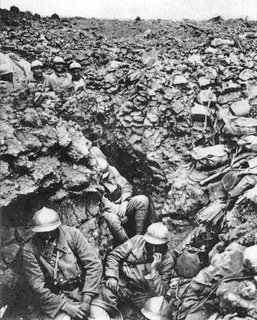
Billy Murray, Where Did Robinson Crusoe Go With Friday on Saturday Night?
Walter Van Brunt, I Left Her On the Beach in Honolulu.
Quinteto Borinquen, Sara.
Joseph Lamb, Patricia Rag.
Manuel de Falla, Nights in the Gardens of Spain: Distant Dance.
Punctual to time 7:28 a.m. two minutes before the line advanced Captain Neville, 8th E. Surreys, kicks off the football that is to take the boys across to Jerry. He is killed as his leg is uplifted after kicking the ball. E. Surreys and Queens go over [the top of the trench] singing and shouting and the ball is punted from one to another...
Jerry's machine gun opens a terrific fire on our chaps and the first wave is speedily decimated. Others jump forward and fill the gaps. I am aghast at the accuracy of the fire. He has plenty of machine guns and is making a frightful carnage. I long to be with battalion so that I can do my best to bereave a German family. I hate these swines.
Private Robert Cude (U.K., East Kent Regiment), journal entry of 1 July 1916, recalling the start of the Battle of the Somme. Cude would survive the war and return to South East London. In 1962, he was an extra in the first Bond film, Dr No.
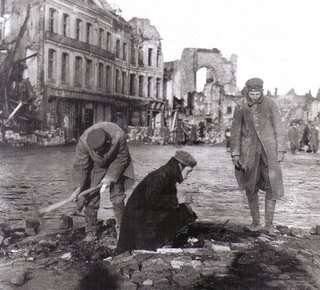
Billy Murray, born in 1877, was one of the first pop stars of the 20th Century, recording seemingly every song imaginable in its first two decades--"Grand Old Flag," "Over There," "Alexander's Ragtime Band," etc. Murray was an engaging singer (though modern ears may find his voice grating) who represented a new, transitory form of white American singing--no longer indebted to European styles, but not yet influenced by black Americans in any great measure.
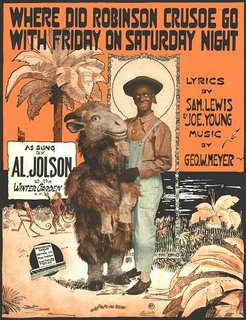
"Where Did Robinson Crusoe Go" is a typical early Broadway song--easy to sing, with a rousing chorus, with lyrics both childish and racy (the lyric hints at all sorts of deviant behavior going on with Robinson Crusoe and Friday, though it's the sheet music illustration that truly disturbs me). It's from the 1916 musical Robinson Crusoe Jr., which starred Al Jolson. (Jolson's rendition of this track could be better, but I couldn't find it on short notice). When, at century's end, the group LMP (La Musique Populaire) covered it as part of their fantastic Century of Song project, they turned "Robinson Crusoe" into the disco epic it was always meant to be.

"I Met Her on the Beach in Honolulu" is from the first generation of Hawaiian novelty songs so enjoyed by Americans throughout the 20th Century (see the Martin Denny entry a while back). Walter Van Brunt was a typically overworked vaudeville/Broadway singer who could best be described as a sort of genial ancestor to Eddie Cantor (or Jerry Lewis, for that matter). "Honolulu" is a pretty marvelous pop number, with Hawaiian guitar and a luau chorus for atmosphere.
Find both tracks in this magnificent archive.
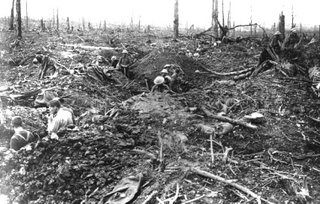
I had just taken up my position when a heavy mortar hit the wall, burying me and two of my company under the rubble...Thankfully my big steel helmet protected my mouth and nose from the earth. When someone called out asking if there was anyone underneath, we shouted 'Yes!' and they started digging us out right away...I felt as if my legs had been chopped off. I sat in the trench curled up in a ball, with my back against the wall and my feet pulled up in front of me, the position I had just been buried in. The weight of the earth had pushed my head forward and torn my back muscles.
Many of us are ill. We've done enough on the Somme. My troop has lost 58 per cent of its original number in the past ten days.
2nd Sergeant Paul Hub (Germany), letters of 20-21 September 1916. Hub would be killed in late August 1918, fighting yet again at the Somme.
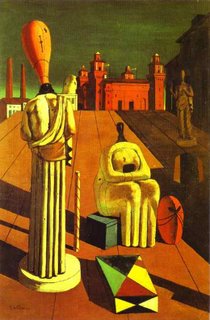
De Chirico, The Disquieting Muses.
These plateaux are pounded by shells dropped during the day, but at night they are full of stretcher-bearers bringing back the day's casualties. We walk through battery C. We wade through mud. Craters filled with water reflect the light every time a rocket is fired. The smell of corpses everywhere.
Captain Paul Tuffrau (France), diary entry of 28 September 1916, recounting his first impressions of the battle of Verdun. After the war, Tuffrau would become the Chair of History and Literature at the Ecole Polytechnique, Paris. He would fight again in WWII, and died at age 86 in 1973.
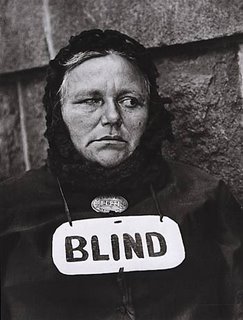
Paul Strand, "Blind".
As Puerto Ricans, who had been under U.S. military rule since the Spanish-American War, were winning U.S. citizenship, record companies began sending scouts in droves to the island. To date, the only Puerto Rican music that had been recorded was by anthropologists, who had carefully sampled everything from traditional ballads to Christmas carols. But the Victor Talking Machine Co. wanted something that would sell, and brought the Quinteto Borinquen to New York to record a number of tracks, one of which was the enchanting "Sara."
On the collection Lamento Borincano--Early Puerto Rican Music.
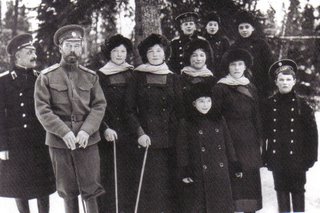
The Romanovs, the last happy year
Hunger does not give you a moment' s peace and you are always dreaming of bread: good Russian bread! We have to work pretty hard too, to the shouts and beatings of the guards, the mocking of the German public...
On Sunday we did no work but stood around outside our huts under the gaze of the Germans with their wives and children, full of curiosity and hate watching us from their windows and from the street. And, it was wonderful, they could see that we were people too and they began to come a little closer. But then some of the little German children began hurling stones at us.
If someone had said to me 'One day you're going to eat soup made from dirty potatoes," I would have said 'What nonsense!' But nothing surprises me here.
Alexei Zyikov, Russian POW in Marienberg, Germany, journal entry of 27 January 1916. (Zyikov never returned to Russia, and likely died in a prison camp. His journal was found by a Russian soldier during the invasion of Germany in WWII.)

"Patricia Rag" is a 1916 composition by Joseph Lamb, one of the finest ragtime composers and one whose reputation has generally been eclipsed by Scott Joplin. While the emergence of jazz records in 1917 didn't wipe out ragtime overnight by any means (there were tons of ragtime discs in the '20s, for instance), there is an autumnal quality to "Patricia Rag," the sense of a music having reached its limits.
Performed by Max Morath, and find on Best of Scott Joplin and Other Rag Classics
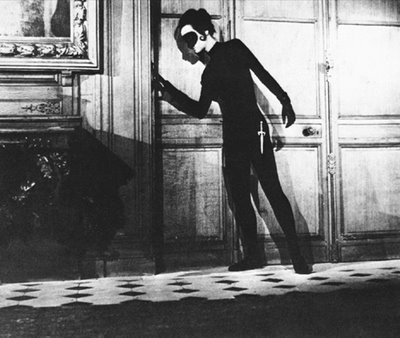
Feuillade's Judex
The worst of London is the girls that run around the streets there. The Strand is the worse place for them that I ever saw. They will come up to you, that is, after about nine oclock and they will take you by the arm and want you to go home with them and stay all night with them.
I have not had much experience with them, but it is an awfull temtation when they act like that. An awfull lot of fellows that go to London come back in bad shape and are sent to the V.D. hospital. There is one V.D. hospital near here that has six hundred men in it. It is a shame that the fellows can't keep away from it.
Private Winnie McClare, Halifax Rifles (Canada), letter of 20 November 1916. McClare was killed in battle near Acheville, France, on 5 May 1917.
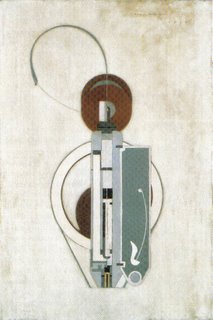
Morton Livingston Schamberg, Mechanical Abstraction.
At a time when most of the European nations were engaged in slaughtering each other and laying the groundwork for the further barbarities of the 20th Century, a Spanish composer finished a work that seemed to hail from a lost era, from the last days of civilized Europe. It was a composition that was, in a sense, a Spaniard's impression of a Frenchman's dream of Spain.
Manuel de Falla had lived in Paris from 1907 to 1914, befriending and working with Debussy and in particular, Ravel. When the war began, he fled back to Spain (allegedly packing so fast that he left his toupee behind in France) and tried to finish some of the compositions he had begun years before. One was a set of piano nocturnes that a friend recommended he turn into a piece for piano and orchestra. So working on an out-of-tune piano in a beachhouse in Sitges, near Barcelona, he finished what became Nights in the Gardens of Spain.
The Nights were an answer of sorts to Ravel's Rapsodie Espagnole, a composition which Falla had thought had an authentically Spanish flavor, but in reality was inspired by Ravel's mother's idealized memories of Spain--Ravel had never been there. So like the Rapsodie, Falla's Nights are an imagining of a mythical Spain--in this case, Granada, which Falla had never visited and knew about mainly through a book he had bought in Paris.
"Distant Dance" is the second of three movements, in which the piano plays a variety of roles--dancer, guitarist, singer. (Much more information here.) Nights was premiered on April 9, 1916, in Madrid.
This 1983 performance is by the pianist Alicia de Laroccha and the London Philharmonic, conducted by Frubeck de Burgos. On The Essential Falla.
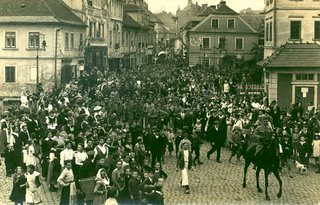
We know the names of some artists who died: among the painters, Umberto Boccioni, Franz Marc, and August Macke; the sculptor Henri Gaudier-Brzeska...the poets Guillaume Apollinaire, Wilfred Owen and Isaac Rosenberg [& the novelists Saki and Alain-Fournier]. But for every one of these names there must have been scores, even hundreds, of men who never had the chance to develop. If you ask where is the Picasso of England or the Ezra Pound of France, there’s only one probable answer: still in the trenches.
Robert Hughes.
All soldier journal entries and letters are from Intimate Voices From the First World War, edited by Svetlana Palmer and Sarah Wallis.
No comments:
Post a Comment